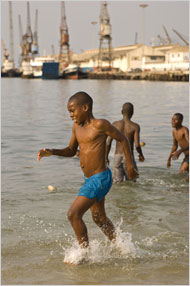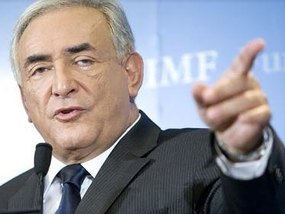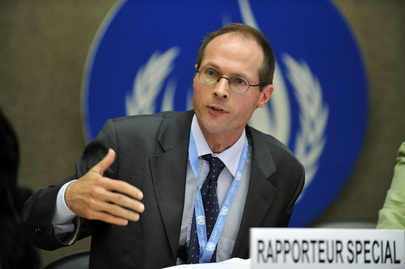|
IMF
Rebuffs Stanford Victims on Antigua Despite Iceland, and Romania,
Ukraine and UN
By
Matthew Russell Lee
UNITED
NATIONS, December 3 -- As the victims of the Stanford scam petition
the U.S. Congress to stop the flow of any funds from the
International Monetary Fund to Stanford's home base of Antigua and
Barbuda, the IMF says such considerations play no role in its
decisions.
On
December 3,
Inner City Press asked the IMF since, "there is a proposal in
the U.S. Senate seeking to block IMF funds to Antigua until the
victims of the Stanford scandal are compensated. Given the IMF's
recent actions on Iceland, does the IMF acknowledge any link in
Antigua between IMF funds and the compensation of banks' victims?"
IMF
spokesperson Jennifer Beckman responded that "it isn’t
part of the IMF’s mandate to help private parties in their claims
against our member governments."
But
in Iceland, the
IMF held back its loan or stand by arrangement until the victims, in
the UK and the Netherlands, of Icesave were made whole. The IMF is
inconsistent, and refuses to forthrightly explain its policies.
Every
two weeks,
the IMF is supposed to hold a press briefing including online
participation by accredited media like Inner City Press. There are
been technical snafus, but those on December 3 reached a new low.
Inner
City Press,
with three or four questions to ask, logged in to the password
protected IMF Media Briefing Center before the 9:30 a.m. start of the
briefing. But the screen remained dark. This was no out of the
normal, as Spokesperson Caroline Atkinson has several times started
late.
At
9:58 a.m..,
thinking that the briefing may have been delayed or canceled, Inner
City Press called the IMF. The answer was that the briefing would be
"rebroadcast" later in the day. But what about online
participation by accredited media?
There
have been
technical issues, Inner City Press was told, and was advised to
submit its questions in writing, they would be answered. At 10:04
a.m., Inner City Press submitted its questions, to Ms. Atkinson and the
general inbox, with a cover note that
for
some reason, the Webcast of this morning's IMF briefing didn't work.
I waited, thinking the briefing was delayed as sometimes happens.
Just now I called the IMF and was told there was a "technical
issue," that the briefing would be re-broadcast. When I said I
had questions to ask, I was told to send them here and they will be
answered. Here they are, I am writing on these topics today:
There
is a proposal in the U.S. Senate seeking to block IMF funds to
Antigua until the victims of the Stanford scandal are compensated.
Given the IMF's recent actions on Iceland, does the IMF acknowledge
any link in Antigua between IMF funds and the compensation of banks'
victims?
In
Romania, the party of the presidential frontrunner has come out
against what it calls IMF imposed layoffs in the public sector. Will
the IMF confirm it is urging such layoffs, if so how many, and what
ramifications if they are not implemented?
Yesterday
2 UN experts told the Press the IMF's Flexible Credit Line
discriminates against poorer countries, & that rather than moving
beyond conditionality, IMF simply imposes conditions later.
Video here.
What
is the IMF's response? And to allegation that health crisis in
Ukraine is due to IMF imposed cuts? On deadline.
Even
twelve hours after these four questions were submitted, the IMF had
answered only one of them.

Crackdown on Stanford fraud, IMF not shown
Subj:
On Antigua
From:
JBeckman@imf.org
To: Innnr City Press
Sent:
12/3/2009 11:11:00 A.M. Eastern Standard Time
Although
we are concerned about the Stanford Victims Coalition, it isn’t
part of the IMF’s mandate to help private parties in their claims
against our member governments.
What
about the other answers? Watch this site.
* * *
IMF
Murky on Angola's Oil, Bond and China Deals, Doles Out $1.4 Billion
By
Matthew Russell Lee
UNITED
NATIONS, November 25 -- Days after announcing a $1.4 billion
arrangement with Angola, the International Monetary Fund held a press
conference call to offer explanations. At the end, things were
murkier than before. Inner City Press asked if the IMF had been able
to fully assess the income and distribution of revenue from the state
owned oil company Sonangol.
The
IMF's Lamine
Leigh, who led the Fund's missions to Angola in August and September,
replied that "in the context of our negotiations, Sonangol
participated fairly well." Inner City Press asked, since
Sonangol has accounts in off shore financial centers and tax havens,
if the IMF had gotten to the bottom of these accounts.
After
a long
pause, Lamine Leigh proffered another answer, that the government has
"committed to steps in the more general area of resource revenue
transparency." But what about the Sonangol accounts?

Oil in Angola, Sonangol's accounts not shown
Inner
City Press
asked about the statement
by IMF Deputy Managing Director and Acting
Chair Takatoshi Kato that in Angola "measures will be taken to
strengthen further the regulatory and supervisory framework."
The IMF's Senior Advisor on Africa Sean Nolan replied that the IMF
analyzed the effect of the exchange rate on borrowers and "on
the banks."
In
fact, Angola's
government has gotten billions in pre-export oil loans from, for
example, BNP Paribas, Standard Chartered and Deutsche Bank. The
latter has made similar loans in Turkmenistan, assailed by
transparency and human rights advocates. How much of the IMF's new
arrangement benefits these banks?
In
fact, the
questioner after Inner City Press, cutting off follow up, was from
Standard Bank. Other than Inner City Press, the only other media
questioner was from Reuters.
Before
the call
ended, Inner City Press was able to ask about Angola's reported $4
billion bond sale planned for December. Sean Nolan said that the
IMF's "understanding" with Angola does involve a
"fundraising effort," but that the timing was not agreed
to, the IMF does not "micromanage" to that extent. Nolan added
that there is an agreement on an "overall limit."
"Is
it four
billion dollars?" Inner City Press asked.
Nolan
replied that
the precise limit will be "clear in the documents," which
have yet to be released. Why play hide the ball?
Nolan
praised the country for "appointing reputable financial and legal
advisers for the transaction" -- JPMorgan Chase will be the manager.
Nolan
continued
that the actual size of the bond sale will depend on how much
"concessionary lending" Angola gets from "countries
with a strong record of financial support to Angola."
Inner
City Press
asked if the size of China's loans to Angola -- China gets 16% of its
foreign oil from Angola -- were known by the IMF or considered.
"That
hasn't
figured in our discussions," the IMF's Nolan responded. Why not? Watch
this site.
* * *
IMF's
Report Buries Its Icesave Conditionality, Enforcer's Duplicity?
By
Matthew Russell Lee
UNITED
NATIONS, November 3 -- While the IMF has acknowledged that its second
round of disbursements to crisis-hit Iceland was delayed for months
by the country's failure to placate those in the Netherlands and UK
who did business with IceSave, the IMF's just released report on
Iceland buries the issue on page 30 of the 98 page report. The IMF
states that
"[t]he
terms and conditions of Nordic loans, amounting to $2.5 billion, have
been finalized. Their disbursement has been linked to resolution of
the Icesave dispute with the U.K. and Netherlands over deposit
insurance liabilities. After protracted discussions, the three
governments have reached an agreement on this"
Once
that
agreement was reached, on October 18, the IMF then went forward with
a letter of intent and memorandum of understanding for the second
tranche of financing. But, as with the IMF's moves in Latvia for
Swedish banks, some see the Fund operating as an enforcement or
collections agent for creditors who even less would like to show
their hand.

Iceland / Icesave protest, but is the heartfelt sign true?
Since
the IMF does
not like to admit or reveal its degree of control over the countries
it lends to, the de facto conditions for loans, such as paying off on
IceSave, are often not explicit in what purport to be full agreements
containing all express and implied terms.
In
fact, the IMF
has claimed that it "no longer" engages in conditionality.
But the Iceland report has an entire chart about conditionalities.
It's just that the most important one was left unsaid. Is this
diplomacy or duplicity?
The
IMF's Iceland
report continues, about other loan requests including from Russia:
"A
loan from the Faroe Islands ($50 million) has already disbursed, and
a loan from Poland has been agreed ($200 million), and will disburse
alongside the next 3 program reviews. A $500 million loan originally
committed by Russia is no longer expected, but the $250 million in
over-financing in the original program, an expected
macro-stabilization loan from the EU ($150 million), and use of an
existing repo facility with the BIS ($700 million, of which $214
million is outstanding) will more than offset this."
Offset may be the right
word. Last year, in the midst of Iceland's abortive run for a seat on
the UN Security Council, the country announced it had to seek a $4
billion loan from Russia. It was after that that the IMF loan
commitment was made -- an "offset," some saw it -- and
after talks in Istanbul, on October 15 the already whittled down loan
request to Russia was formally rejected.
Then the deal
with the UK
and Netherlands, and the IMF's releasing. While the IMF calls these
types of moves only technical, others call them power politics. Watch
this site.
* * *
IMF
Plays Ukraine, Zim and Pakistan As "Technical" Questions,
Pushes Tax Hikes in Serbia
By
Matthew Russell Lee
UNITED
NATIONS, October 22 -- Are the International Monetary Fund's
negotiations with countries about the level of taxes and salaries for
public sector employees, the pricing of electricity and the
privatization of social services political, or merely "economic
and technical"? The questions arose Thursday in connection with
Ukraine, Zimbabwe and Pakistan, among others, in the IMF's first
press briefing since its annual meeting in Turkey.
IMF
spokesperson
Caroline Atkinson fielded questions for half an hour, leaving
unanswered one submitted by Inner City Press about Serbia, where the IMF's
Paul Thompson has been quoted that "if the Serbian
delegation has a concrete pan for decreasing expenses, we will
support it, if not, they
will have to agree with us and think about
increasing taxes." Left unanswered: how is raising taxes merely
"technical"?
Ms.
Atkinson did
respond to Inner City Press' questions about Ukraine, Zimbabwe and
Pakistan. While a full transcript is available online here,
and video here,
in sum the Q & A went as follows:
Inner
City Press asked, In Ukraine, the opposition party is critical of the
IMF as funding the campaign of Tymoshenko. What is the IMF's response
to the opposition's criticism? Ms. Atkinson replied that IMF funds go
to the central bank, and that the IMF has a team on the ground in
Kiev for a third review.
The
opposition was
not, it seems, saying that money from the IMF is being used by
Tymoshenko for advertisements or to pay poll workers, but rather "MP
and opposition government's finance minister, Mykola Azarov, said
this at a meeting with delegates of an IMF mission, 'We must say that
the program of cooperation with the IMF has turned out to be
ineffective, and nothing is left but to consider the IMF's
assistance
as politically motivated, as funding of one of the candidates running
for the presidency.'"
When
another
reporter asked a follow up question about Ukraine, wondering if with
the IMF mission on the ground, the upcoming election "is an
issue," Ms. Atkinson said the IMF does not comment while a
mission is in the field, negotiating a program, but that information
-- and one hopes some questions and answers -- will be provided once
the mission is completed

IMF points the way, in budgets... and politics?
On
Zimbabwe, Inner
City Press asked, "NGOs are critical of the IMF for, they say,
pushing Zimbabwe to privatize its social services system. Has the IMF
pushed for that, and how does it respond to the criticism?" Ms.
Aktinson, while saying she can get back to Inner City Press with more
information, argued that the IMF does not favor or disfavor
particular privatizations, but must be pushing to strengthen the
social service sector to help the poor.
But
speaking just
ahead of civil society's consultative meeting with an IMF team under
Article IV of the Fund's Articles of Agreement, NANGO said
"'we
are opposed to some IMF polices such as privatization of basic social
services. We know it from the past that some IMF policies have worked
against people in this country. They have affected the social
services sector and their polices are anti-people and negative'...
[NANGO] said some of the IMF instigated polices which had brought
suffering to the people were the Economic Structural Adjustment
Programme (ESAP) and Zimbabwe Programme for Economic and Social
Transformation (ZIMPREST)." It's a pretty specific critique,
and we'll publish the IMF's response upon receipt.
Following
up on
Inner City Press' questions and article from August 2009, it asked
"in Pakistan, the IMF in August extended for a year the
country's time to eliminate electricity subsidies. Now, while the
IMF
says 2 price increases will be implemented, others say this is not
possible politically. What is the IMF's thinking on consumer power
pricing in Pakistan?"
Ms.
Aktinson
replied that "as I believe you know, the issue of issue of
electric subsidy is typically done by the World Bank and Asian
Development Bank," that IMF gets involved due to the budget."we
will be having another review of the Pakistan program in early
November." We'll be there....
* * *
On
Food Speculation, UN's Expert Says Nothing's Being Done, S. Korean Land
Grabs from Madagascar to Sudan, Brazil on Ethanol
By
Matthew Russell Lee
UNITED
NATIONS, October 21 -- After many speeches at the UN about the need
to crack down on financial speculation in food, nothing has been
done, the UN's expert on the right to food told Inner City Press on
Wednesday.
Olivier de Schutter, a Belgian law professor just back
from a visit to Brazil about, among other things, the loss of land
for food to ethanol, replied that "nothing is moving at the
inter-governmental level." This despite a statement by the G-20
in April favoring the regulation of hedge funds which present
systemic risk. The argument is that commodities index funds which
speculate in food present systemic risk to net food importing
countries. But nothing has been done.
De
Schutter spoke
about the monopolization of the seed industry, and made a slew of
recommendations for governments. The three top monopolizers --
Monsanto, Dupont and the Swiss-based Syngenta -- are all members of
the UN Global Compact, and claim to comply with human rights. De
Schutter pointed out the antitrust law is directed as national and
not global or subnational markets. It is all very heady but one
wonders what effect it has.
Brazil
might be
one of de Schutter's claims to impact. He spoke glowingly of
President Lula, saying that Brazil has said that only 19% of land can
be used for sugar cane for ethanol, and has committed to monitor
labor rights. But what about, for example, Indonesia and Malaysia?

De Schutter, action on food speculation not shown
After
De
Schutter's briefing, Inner City Press asked his staffer for an update
on the proposed land grab in Madagascar by South Korea based Daewoo,
which was reputed after the coup in that country. De Schutter had
been scheduled to visit, but it was put off by the coup. The same
thing happened in Honduras. So perhaps De Schutter does have an
effect after all, mused one wag.
Footnote:
immediately after De Schutter's briefing, the UN's Haile Menkerios
was scheduled to speak to the Press about Madagascar. While the UN
usually compartmentalizes its work such that a rapporteur looks at
land grabs, while the Secretariat remains on "political affairs"
narrowly defined, this land grab played a role in the change of
government. Now it's said the South Korean deal is being pursued from
India, while South Korea appears to have moved on to 690,000 hectares
in Sudan. Watch this site.
Click
here
for an Inner City Press YouTube channel video, mostly UN Headquarters
footage, about civilian
deaths
in Sri Lanka.
Click here for Inner City
Press' March 27 UN debate
Click here for Inner City
Press March 12 UN (and AIG
bailout) debate
Click here for Inner City
Press' Feb 26 UN debate
Click
here
for Feb.
12 debate on Sri Lanka http://bloggingheads.tv/diavlogs/17772?in=11:33&out=32:56
Click here for Inner City Press' Jan.
16, 2009 debate about Gaza
Click here for Inner City Press'
review-of-2008 UN Top Ten debate
Click here for Inner
City Press' December 24 debate on UN budget, Niger
Click here from Inner City Press'
December 12 debate on UN double standards
Click here for Inner
City Press' November 25 debate on Somalia, politics
and this October 17 debate, on
Security Council and Obama and the UN.
* * *
These
reports are
usually also available through Google
News and on Lexis-Nexis.
Click here
for a Reuters
AlertNet piece by this correspondent
about Uganda's Lord's Resistance Army. Click
here
for an earlier Reuters AlertNet piece about the Somali
National
Reconciliation Congress, and the UN's $200,000 contribution from an
undefined trust fund. Video
Analysis here
Feedback: Editorial
[at] innercitypress.com
UN
Office: S-453A, UN, NY 10017
USA
Tel: 212-963-1439
Reporter's
mobile (and
weekends):
718-716-3540
Other,
earlier Inner City Press are listed here, and some are available
in the ProQuest service, and now on Lexis-Nexis.
Copyright
2006-08 Inner City Press, Inc. To request
reprint or other permission, e-contact Editorial [at]
innercitypress.com -
|